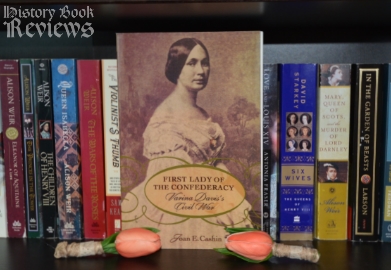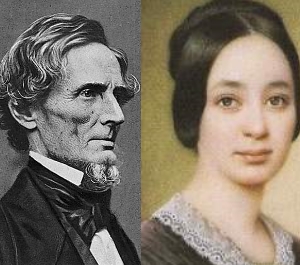First Lady of the Confederacy: Varina Davis's Civil War
by Joan Cashin

Overview
- Author: Joan Cashin
- Published: 2008
- Topics: 19th Century, American Civil War, United States of America

Review
It always makes me sad to read a biography of a person who seems to have experienced far more misery and heartbreak in their lives than they did joy and love. I really hope I'm wrong in this case, that Varina Davis actually felt inner peace and happiness, but after reading First Lady of the Confederacy I have a sinking feeling that her life was more endured than it was enjoyed. And the chief cause of her unhappiness? Her husband, Jefferson Davis, one of the grossest people who ever lived. If you don't read this book, just trust me---He's the worst.
This book claims to be the first biography of Varina Davis written by a professional scholar, and it seems to be the only one written in the last 50 years, so it is of great historical value. Much attention has been paid over the years to Mary Todd Lincoln, the First Lady of the Union and wife to Abraham Lincoln, but Varina has been nearly invisible in the years since her demise. It was thrilling for me to read this book and to become acquainted with this significant historical figure, who I had never learned about before. And Joan Cashin does a fantastic job chronicling the life and experiences of this fascinating woman.

Jefferson and Varina Davis. See what I mean about his beard?
Varina Davis was the wife of Jefferson Davis, the man named President of the Confederacy when the United States was enmeshed in Civil War during the years 1861-1865. Though the South lost the Civil War, the Davis' remained symbols for the rest of their lives of the Lost Cause of the South and the spirit of the Confederacy. This was what hundreds of thousands suffered and died for in the South during the war, something millions would have given their lives to protect. Tragically and ironically for Varina, she didn't really believe in the Confederate cause and she suffered terribly from her association with the Confederacy through her husband. She also suffered from her association with her husband, period.
Right from the start, in the book's introduction, Cashin makes the disclaimer that: "I have tried to be fair to Jefferson Davis, who is easy to dislike." From that point on, nearly every sentence written about him is subtly laced with scorn and disdain. I laughed out loud at the caption under a photograph of him: "Jefferson Davis, 1850s. Considered a handsome man." (Cashin may as well have written: "'CONSIDERED' a handsome man...ugh, no way, he's repulsive!") As I read further in the book, my amusement with how much Cashin despised Jefferson Davis evaporated, and I began to despise him myself. Jefferson patronized Varina; he tried to change her personality and threatened to drink heavily and visit prostitutes if she didn't obey him; he sided with his family when they were cruel and manipulative to her; he fell in love with another woman and abandoned Varina for months at a time so he could write love letters to someone else; and he was obsessed with proving that when he was caught by Union soldiers in 1865 he was in fact NOT dressed like a woman (he kind of was). In an essay he wrote near the end of his life, he stated on Page 1 that it had been his greatest misfortune to have lost his wife early in their marriage (he meant his first wife, Sarah Knox Davis, who died a mere three months after their wedding), despite having been married to Varina for over 40 years. He only mentioned Varina in the last paragraph of his essay, whereupon he gave the incorrect date of their marriage. Yeah, f*** you too, Jefferson.
The glimpses we get of Varina herself through this book are magnificent. Enough sources and letters survive to really hear her voice and get a sense of who she was. The great conflict of Varina's life was that, fairly uniquely in this time, she could see both points of view in the Civil War. Moreover, if she felt strongly about one side winning over the other, it was the North. Cashin does a wonderful job analyzing Varina's letters, which say different things to different people, to try to understand her true inner feelings. This is nearly impossible to do with historic sources when the subject is long dead, but Cashin comes as close to it as I think is possible. And the woman she uncovers appears to us as wise, kind, strong, devoted to her duties as she saw them, painfully divided in her emotions and loyalty, and a witty, sarcastic conversationalist. She was never broken, despite having five out of her six children predecease her, despite the tragedy of the Civil War, and despite the overall grossness of her husband. She was a woman who was unfailingly loyal to her friends (many of them from the North) and family, unyieldingly strong during crisis and trauma, and determined to achieve her own goals whatever the circumstances.
And the circumstances were hard: Jefferson was fundamentally unable (or unwilling) to adapt to the post-war world. In fact, he never really left the war, and it was his obsession for the rest of his life. Unfortunately for Varina, he dealt with this by refusing to hold down a job, moving in with a widow and trying to convince Varina to move in with them (Three's Company, eat your heart out), handing out photographs of himself in what he said he was wearing during his capture (years and years after the war, still trying to prove he wasn't dressed as a woman), and growing literally the most disgusting beard I've ever seen. Through all this, Varina stayed loyal. She even started sewing for money to support the family. When Jefferson died in 1889, you can almost hear Cashin's sigh of relief (and Varina's, as well). Varina went on to live another 17 years, moving to the North where she worked writing articles for newspapers! This outraged many people, who saw her only as the living representation of the Lost Confederacy. Few people ever understood her in all her complexity and contradictions, and this is part of what makes her so compelling.
One quick note: Don't read this book if you don't know anything about the history of the Civil War. There is no background or overview of the cause, the reasons, or the motivations behind the war, and no information on the events themselves. It is purely the story of a life that was lived against the backdrop of the Civil War, and many of the details will be confusing if you don't understand the context of the War and its tensions.
You can tell from photos of Varina Davis that she was beautiful, and you can tell from this biography that her beauty was not just skin deep. She lived a sad, struggling life but managed to maintain some joy in her existence, and kept the love and devotion of many friends until she passed away. She was a half-breed, never belonging fully to either the North or the South, though at the end of her life she said in print that the right side won the Civil War. Joan Cashin deserves praise for her remarkable achievement in this book: Reintroducing the world to the First Lady we have all but forgotten.
She also helped me to see that I would rather face the bloody battlefield of Antietam than marriage to Jefferson Davis.


